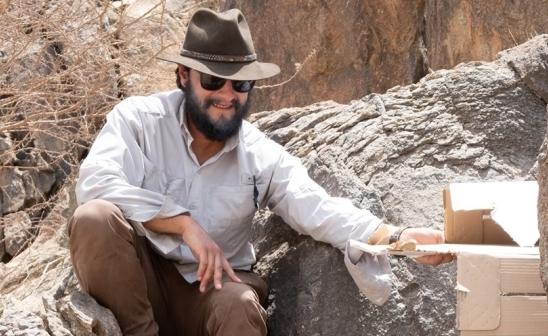January 30-31: CMES Master Class with Ahmad Al-Jallad

Thursday, January 30, 2025
Workshop: “The Writing Traditions of Ancient Arabia and towards a Linguistic Atlas”
10am-noon; 1:30-3:30pm
Classics 110
Recent scholarship has significantly revised our understanding of pre-Islamic Arabia, challenging the previously held notion of linguistic and cultural homogeneity in the region. Archaeological and epigraphic advances over the past century have revealed a complex social and linguistic landscape, extending from the Yemeni frontier to the Syrian Desert. This Master Class will provide a comprehensive analysis of the major inscriptional corpora of Ancient North Arabia. Particular emphasis will be placed on the poorly understood Thamudic texts of central and western Arabia, incorporating newly discovered material from the Mecca region. Additionally, the course will examine epigraphic evidence from East Arabia, the “transitional” texts of Qaryat al-Fāw and the Haram, and the geographically dispersed Ancient North Arabian inscriptions found in Mesopotamia. Through a detailed examination of these corpora, the seminar will investigate the cultural and historical contexts in which these languages and writing traditions flourished, and their contributions to the understanding of Arabia’s pre-Islamic cultural and linguistic diversity. We will produce several refined linguistic maps to trace the diachronic evolution of languages in Ancient Arabia, from the Iron Age until the domination of Arabic, as we know it, in the 6th century CE.
Friday, January 31, 2025
Farouk Mustafa Memorial Lecture Series: “Ancient Allāh”
4:30pm
Stuart 105
Before the rise of Islam, Allah was already recognized and worshipped across northern and western Arabia. Even the Quran acknowledges that Muhammad’s adversaries venerated Allah (Q 31:25). However, concrete evidence of Allah’s worship in the pre-Islamic material evidence from Arabia is scarce. While the divine name “Allah” appears in Nabataean personal names, it is curiously absent in their religious invocations. A few inscriptions in antiquity, spanning from Qaryat al-Fāw in south-central Saudi Arabia to the Ḥigāz, invoke Allāh, but these do not reveal much about his perceived role in the cosmos nor do they tell us anything about his associated mythology. Recently, a groundbreaking discovery in Jordan has the potential to transform our understanding of the pre-Islamic Allāh. The Missing Link/BES survey project, directed by the speaker, documented a new Safaitic text containing a relatively detailed narrative and prayer to Allāh. This discovery offers the first real insights into pre-Islamic beliefs about the deity and provides a valuable link for understanding the connections between ancestral Arabian religion and cognate Semitic mythologies.
Ahmad Al-Jallad is a philologist, epigraphist, and historian of language. His work focuses on the languages, writing systems, history, and cultures of pre-Islamic Arabia and the ancient Near East. His latest book reconstructs the religion and rituals of Arabia’s pre-Islamic tribespeople: The Religion and Rituals of the Nomads of Pre-Islamic Arabia A Reconstruction Based on the Safaitic Inscriptions Brill 2022: https://brill.com/view/title/61413?language=en. He directs epigraphic projects in Jordan and Saudi Arabia, and is the co-editor of the Online Corpus of the Inscriptions of Ancient North Arabia: ociana.osu.edu.
 THE UNIVERSITY OF CHICAGO
THE UNIVERSITY OF CHICAGO

